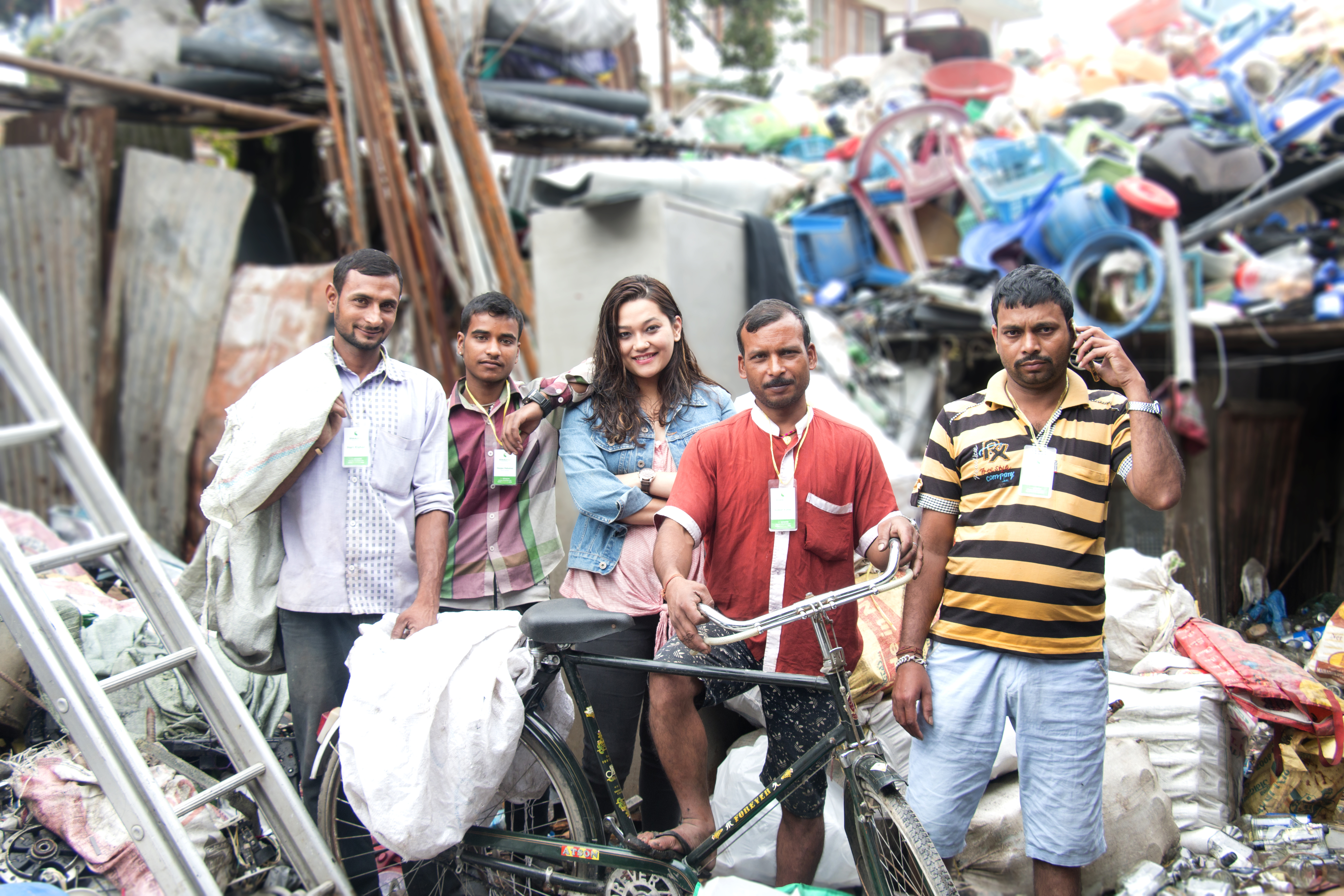A clean country built on sustainable and socially inclusive waste management
Three ways to realize the vision:
1) Generate baseline data for informed policy making in the sustainability sector.
2) Strengthen the informal, decentralized approach to waste management.
3) Integrate environment sustainability education in schools.
Data is gold
Waste management is easy to neglect in Nepal due to lack of data. Problems such as hunger, poverty, brain-drain and corruption still rule the charts, and rightfully so as they are data-based. The only time waste management is a problem is around monsoon, or during political strikes, after which the streets are flooded with garbage. Nepal does not have statistics on waste generation, recycling and reuse. Improved data is needed at local, district and state levels to understand the different sources of waste generation and to design informed regulations.
Every day, Kathmandu Valley alone generates around 1.2 million kg of solid waste and it is increasing at a dizzying speed. The landfill at Sisdole, around 27km southwest of Kathmandu, is still being used although it has reached its capacity. Unfortunately such macro level data rarely instigates people to take steps at a micro or organization level.
On the other hand, for example, if companies have data on the benefit of reducing the waste produced during product development, they will introduce technologies to increase efficiency to reduce waste without damaging products. This can cut down on material usage and save money. Data can help create solutions so both our economy and environment can thrive.
The government on its part has been designing various programs, one of the most popular ones being the distribution of two bins to encourage waste separation at source. But such programs haven’t been successful as people started using these free bins for storage and other usage. The assumption was that the number one cause of mismanagement is lack of free basic infrastructure like bins, but reports suggest a bigger problem is lack of awareness. Thus distribution of bins alone will not make lasting difference until supplemented with a thorough and consistent awareness drive.
The Nepali plastic industry has an investment of at least Rs 40 billion and employs thousands of people. Thus bringing policies on plastic ban would be like fighting the goliaths. Nevertheless, a win-win solution could be supporting the Davids—smaller companies working on recycled products. While discouraging consumption of single-use materials is good, it is also important to encourage recycled products. The government can play a strong role in improving the market for recycled goods by at the very least incentivizing procurement from recycled sources. An even stronger case for this could be made if there was data to back its contribution to the GDP and cost savings.
Only by asking the right questions will we get relevant data to take effective policy actions.

Power of the informal
The recovery of post-consumer waste in cities is driven by the informal ecosystem. Leveraging this invisible ecosystem of waste entrepreneurs has the potential to decrease the volume of waste sent to landfills in Nepal by at least 40 percent.
At present, municipalities, organizations and institutions struggle to work effectively with informal stakeholders—despite increasing evidence of the commercial, environmental, and social benefits of such partnerships. Through our platform at khaalisisi, we are connecting the hard-working, omnipresent network of waste entrepreneurs, locally known as khaalisiwalas, with municipalities, brands, and waste management companies. The goal is to recover post-consumer waste efficiently and more inclusively.
Rather than seeing informality as a problem and developing a new system, we leverage the existing informal infrastructure. Municipalities can utilize informal infrastructure to bring down operational costs; waste management firms can source from it; apartments and small businesses can send their recyclable waste directly to informal stakeholders, all the while getting paid for their waste.
The average number of human resources assigned for waste management was 118 per metropolitan city; compare that against 13,000 waste entrepreneurs present in every nook and alley of Kathmandu, ready to pay people for their waste. The informal sector is both less expensive and more efficient because of its hyperlocal approach and network efficiency. Seventy percent of municipalities fully rely on the central government’s budget to manage municipal solid waste. Scrap is an old business, and its infrastructure within the informal ecosystem is well-established. The government won’t need to spend to develop new infrastructure.
The informal sector is a reality in Nepal. By collaborating with this organically built network, we are not only keeping together a system that provides a living for many but one that is potentially more effective, cost-efficient and scalable.
Start them young
For the first time, schools were shut for four days back in 2021, not owing to the traditional bandhs but due to air pollution. Around eight million students were affected, but what is more alarming is our failure to address the permanent, long-term effects. Introduction to sustainability in early education has thus become important.
This is based on a simple belief: children are receptive and have great potential to bring about a change. There is an urgent need for holistic environmental education in schools. Most of what they now learn is limited to sweeping the waste out of sight; we need to talk about solutions. Those who know about the facts and circumstances are more likely to correct their behavior.
A study in Poland showed that taking part in an extra waste management module encourages students to act as multipliers, in that they inspire discussions about waste disposal with their families. Lessons about waste management are a potential way to solve a global problem as they also have effects beyond school. Students need to think that the environment is worth protecting and to take decisive steps against irresponsible waste disposal. Subsequently, they may involve society in realizing and assessing the problem to ensure long-term conscious consumption. Schools need to create a model where children are at the center of major societal change.

Waste management is an opportunity to boost the economy to extract value, generate employment and create a cleaner environment. The biggest challenge: somebody needs to commit. The fear is that this conversation about waste management will fizzle out. The governments and businesses need to invest in the idea of reforming the way we approach waste management.
The Gita says: “Let the human community protect the environment for their own survival and the biodiversity around”. Don’t worry about nature, she will survive. If not for her, do it for yourself, for mankind. Mother Nature will find a way, but humans, well, we will have to make our way through peaceful coexistence with our environment.
Quick Questions:
Three of your favorite books?
-
‘Asura:Tale of the Vanquished: The Story of Ravana and His People’ by Anand Neelakantan
-
‘When Breath Becomes Air’ by Paul Kalanithi
-
‘The Hard Thing About Hard Things’ by Ben Horowitz
An entrepreneur you look up to?
Rather than an entrepreneur let me tell you the name of the leader who inspires me: Martin Luther King Jr.
A quote you live by.
‘Why not?’











